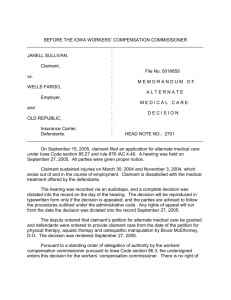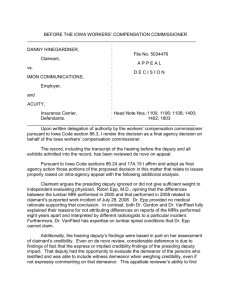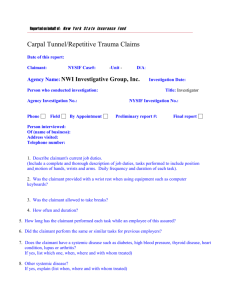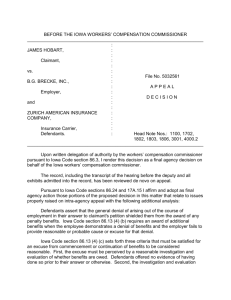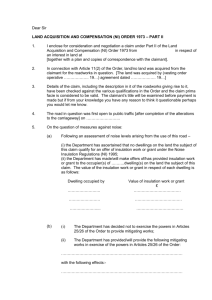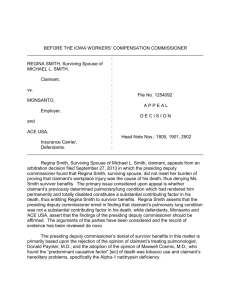BEFORE THE IOWA WORKERS` COMPENSATION COMMISSIONER
advertisement
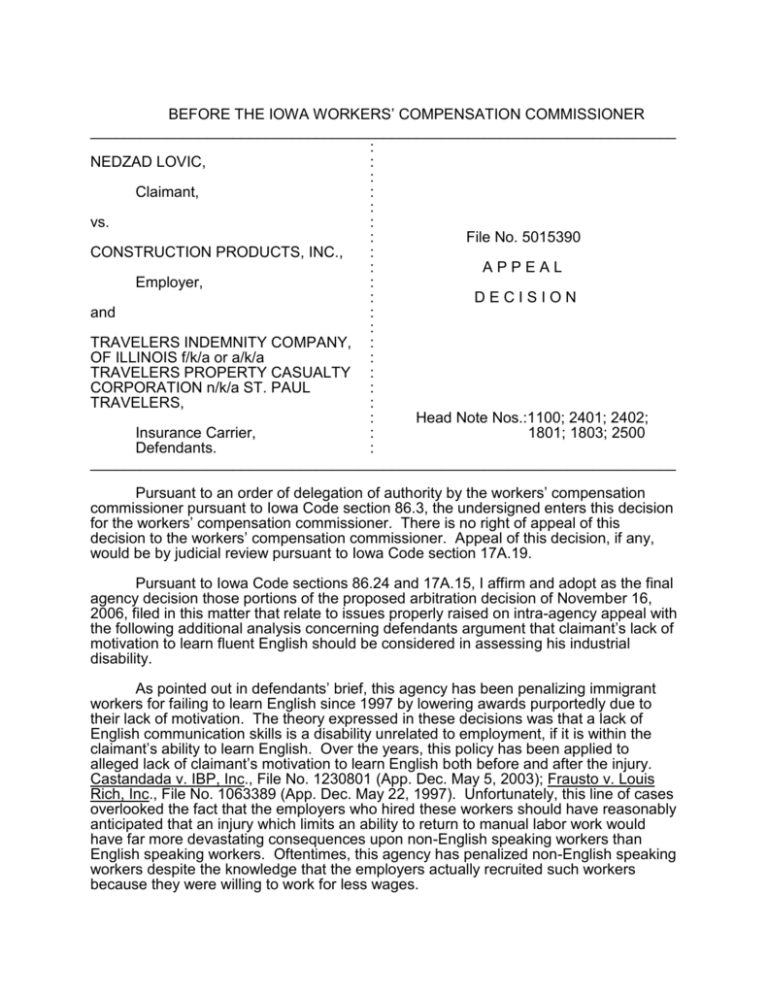
BEFORE THE IOWA WORKERS’ COMPENSATION COMMISSIONER ______________________________________________________________________ : NEDZAD LOVIC, : : Claimant, : : vs. : : File No. 5015390 CONSTRUCTION PRODUCTS, INC., : : APPEAL Employer, : : DECISION and : : TRAVELERS INDEMNITY COMPANY, : OF ILLINOIS f/k/a or a/k/a : TRAVELERS PROPERTY CASUALTY : CORPORATION n/k/a ST. PAUL : TRAVELERS, : : Head Note Nos.:1100; 2401; 2402; Insurance Carrier, : 1801; 1803; 2500 Defendants. : ______________________________________________________________________ Pursuant to an order of delegation of authority by the workers’ compensation commissioner pursuant to Iowa Code section 86.3, the undersigned enters this decision for the workers’ compensation commissioner. There is no right of appeal of this decision to the workers’ compensation commissioner. Appeal of this decision, if any, would be by judicial review pursuant to Iowa Code section 17A.19. Pursuant to Iowa Code sections 86.24 and 17A.15, I affirm and adopt as the final agency decision those portions of the proposed arbitration decision of November 16, 2006, filed in this matter that relate to issues properly raised on intra-agency appeal with the following additional analysis concerning defendants argument that claimant’s lack of motivation to learn fluent English should be considered in assessing his industrial disability. As pointed out in defendants’ brief, this agency has been penalizing immigrant workers for failing to learn English since 1997 by lowering awards purportedly due to their lack of motivation. The theory expressed in these decisions was that a lack of English communication skills is a disability unrelated to employment, if it is within the claimant’s ability to learn English. Over the years, this policy has been applied to alleged lack of claimant’s motivation to learn English both before and after the injury. Castandada v. IBP, Inc., File No. 1230801 (App. Dec. May 5, 2003); Frausto v. Louis Rich, Inc., File No. 1063389 (App. Dec. May 22, 1997). Unfortunately, this line of cases overlooked the fact that the employers who hired these workers should have reasonably anticipated that an injury which limits an ability to return to manual labor work would have far more devastating consequences upon non-English speaking workers than English speaking workers. Oftentimes, this agency has penalized non-English speaking workers despite the knowledge that the employers actually recruited such workers because they were willing to work for less wages. CONSTRUCTION PRODUCTS, INC. Page 2 What has been troublesome to many, including myself, is that this agency has never similarly treated non-immigrant workers for failing to learn other skills. Defendants would certainly have trouble citing any agency or court precedent in the workers’ compensation arena where an industrial award for an English speaking worker was lowered because the injured worker, before the injury, failed to anticipate he would suffer a devastating work injury and failed to obtain a type of education before the injury that would mitigate the effects of such an injury. There are cases in which post-injury retraining or lack of effort to obtain such, may be relevant to an industrial analysis, but only if it is shown by the party desiring its use that such retraining would be likely successful and would likely lead to a gainful employment. Without such proof, use of any retraining effort, or lack thereof, in assessing a loss of earning capacity, would be speculative, at best. Stewart v Crose Cartage Co., Appeal Dec Filed 2/20/87; Umphress v Armstrong Rubber Co., Appeal Dec Filed 8/27/87. In this case, there was no proof offered whatsoever of the likelihood that claimant would learn fluent English from the classes that may have been available to him as reported by vocational rehabilitation consultant, Susan McBroom, M.S., or that claimant would obtain suitable work after taking these classes. (Exhibit A-19:30). We simply cannot assume that claimant was capable of such training or that such classes are generally successful in leading to employment where fluent English is required. The only evidence found credible by the presiding deputy concerning claimant’s mental ability was that he has a mental impairment. I agree with that finding. The conclusion of James Andrikopoulos, Ph.D., (Exhibit A-31:41) that claimant was malingering is inconsistent with the views of all other medical providers involved in this case. As pointed out by claimant in his brief, the Iowa District Court has directed this agency to no longer consider a workers’ failure to learn English in determining industrial disability. This directive was eventually carried out by this agency. see Diaz v. Second Injury Fund of Iowa, File No. 5001752 (App. Rehearing Dec. January 23, 2006). Consequently, the old Castandada and Frausto appeal decisions are no longer valid agency precedents. In the Diaz, appeal rehearing decision, cited above, the decision did not consider the impact of the lack of English speaking skills on disability, negative or positive. I prepared that decision and I based that decision upon the fact that claimant had returned to work and claimant did not offer evidence that his lack of English communication skills aggravated his disability. However, contrary to Diaz, we have convincing expert opinion in this case from a vocational consultant, Roger Marquardt (Exhibit 6), that the restriction to only sedentary work is particularly devastating to claimant who lacks English communication skills when only non-sedentary work is available to such persons and when claimant’s only work experience involved heavy work. Even defendants’ expert, McBroom, agreed that the lack of English skills worsened claimant’s ability to return to work. Claimant in this case was shown to be clearly permanently and totally disabled. Signed and filed this 27th day of December, 2007. ____________________________ LARRY WALSHIRE DEPUTY WORKERS’ COMPENSATION COMMISSIONER CONSTRUCTION PRODUCTS, INC. Page 3 Copies to: James Byrne Attorney at Law 6611 University Ave, Unit 200 Des Moines, IA 50311-1655 William D. Scherle Attorney at Law 218 6th Ave, Floor 8 Des Moines, IA 50309-4008
